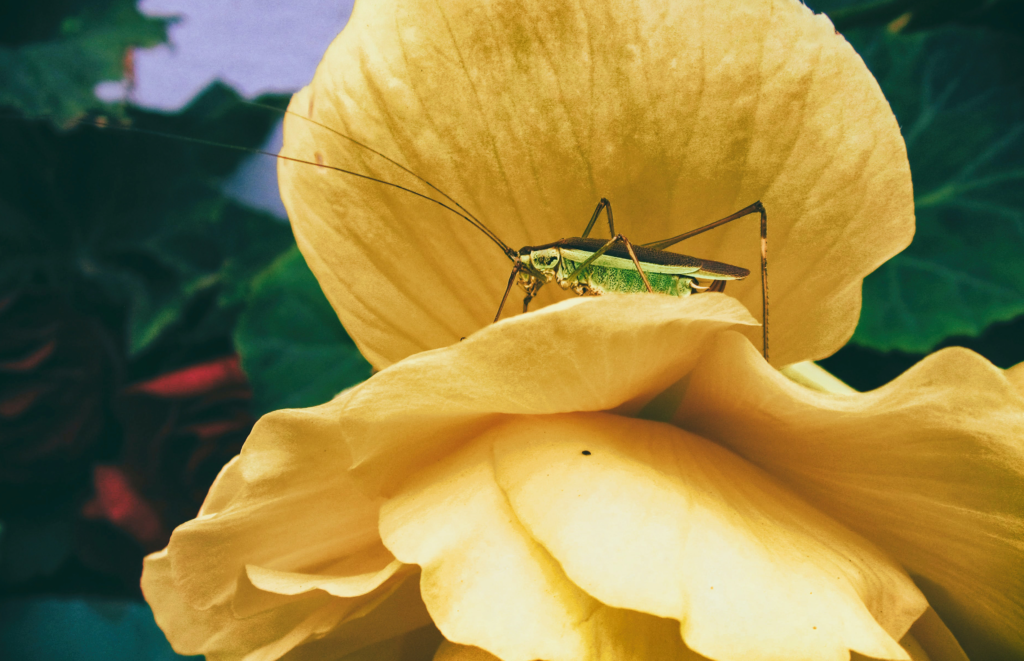Playing with Space: A Micro-Interview with Tennessee Hill

Photo by Ashish Joshi on Unsplash
Katie Roberts: How does it feel to have your poem, “Cricket Noon,” be chosen as the winner for the Porter House Review 2019 contest by Ada Limón?
Tennessee Hill: It feels unreal. I had the opportunity to see Ada Limón read at NC State about a year ago. Her fierce kindness, command of the room, and stewardship of poetry has always stuck with me. To feel seen by her in this huge way is not only an honor but a big-butterfly moment.
Roberts: I love the way “Cricket Noon” weaves the narrative of the speaker’s neighbor planting their prized begonias and the crickets struggling to escape the bucket of water, with the threads of their brother’s helplessness in jail. Did your poem begin with the image of the beetle begging to be bailed out or the brother being in jail?
Hill: My poem began with the first line. I’d had it stowed away in my notebook for weeks. When I sat down with that first line, I’d also just watched something—I can’t recall what—that said, “bail the water from the boat,” and it made me think of a scene in the animated Peter Pan in which Captain Hook and Mr. Smee are furiously bailing water from a sinking boat in that frantic, funny cartoon way. These thoughts energized my draft with a morose sense of peril whilst maintaining an approachable absurdity.
Roberts: The form of your poem is vibrant and allows for many different elements to coalesce. What moved you to shape your poem with this particular spacing and these distinct line breaks?
Hill: Trial and error. A professor of mine in graduate school, Eduardo C. Corral, always urged us to put poems in different containers. I tend toward the long line anyway, so I try to challenge my habits. I was tabbing the lines around like a madwoman when I landed on a caesura style that created a beautiful rhythm and semblance of control for a speaker who is more-or-less a helpless observer.
Roberts: You mention Texas in your poem. Is there a particular region that informs your poetry?
Hill: I took a Southern Literature course that really revolutionized the way I viewed my own image-set and poetic environment. I’m drawn to exploring the pastoral southern landscape through surrealism. I grew up on the South Texas Dickinson Bayou, so I feel like each of my poems has a little swamp in it.
Roberts: Who are some of your recent literary influences? What are you currently reading?
Hill: Claudia Emerson’s body of work has been my biggest teacher, though I feel fiction influences my poetry a lot. I love Karen Russell, Steven Millhauser, Jeffrey Eugenides, and Steinbeck. I’m currently reading Marie Howe’s What The Living Do and a non-fiction ornithology book, The Genius of Birds by Jennifer Ackerman.
Roberts: Tell me about the last poetry reading you attended.
Hill: In Raleigh, I was constantly attending readings hosted by So&So books, a shop run by the wonderful Chris Tonelli. My most recent in-person reading was crazily enough in February I was able to see Jane Craven and Dorianne Laux read in the basement of Neptune’s, a dark little bar in downtown Raleigh, during the North Carolina Book Festival. Both read with vulnerability—Dorianne has such an honesty, and Jane is the most graceful poet I have ever met. Both women are dear to me. Maybe this is silly, but I feel poems are that much more lovely coming from the voice and heart of someone we trust.
Roberts:You have been published in Sandy River Review, Crab Orchard Review, Kaaterskill Basin, and Porter House Review. How did you start to publish your work?
Hill: I was a tenacious undergrad. I didn’t start writing poetry until my first year of college, and I went a little hog-wild in the midst of falling in love with it; writing, reading, Submittable stalking—that first-love kind of mayhem. I was enamored and very optimistic. I was also encouraged by my professors, which was huge. In truth, I submitted anywhere and everywhere without a reading fee. My strategy was just to stick with it.
Roberts: Do you write every day, or do you have a ritual when it comes to when and where you write?
Hill: I try to write, think about writing, edit, read, or talk to a writer friend every day. Intentionality is my only goal.
Roberts: What projects are you currently working on?
Hill: Honestly, I’m stretched a bit thin right now, so I’ve done more reading than writing, though I must say this period of rest has yielded some beauty. I’ve been writing 24/7 for the last 5 years in various academic programs. It’s a total change of pace to focus on myself, my life, my people, and my joy outside of the production and validation of publishing and writing. My project is me!


